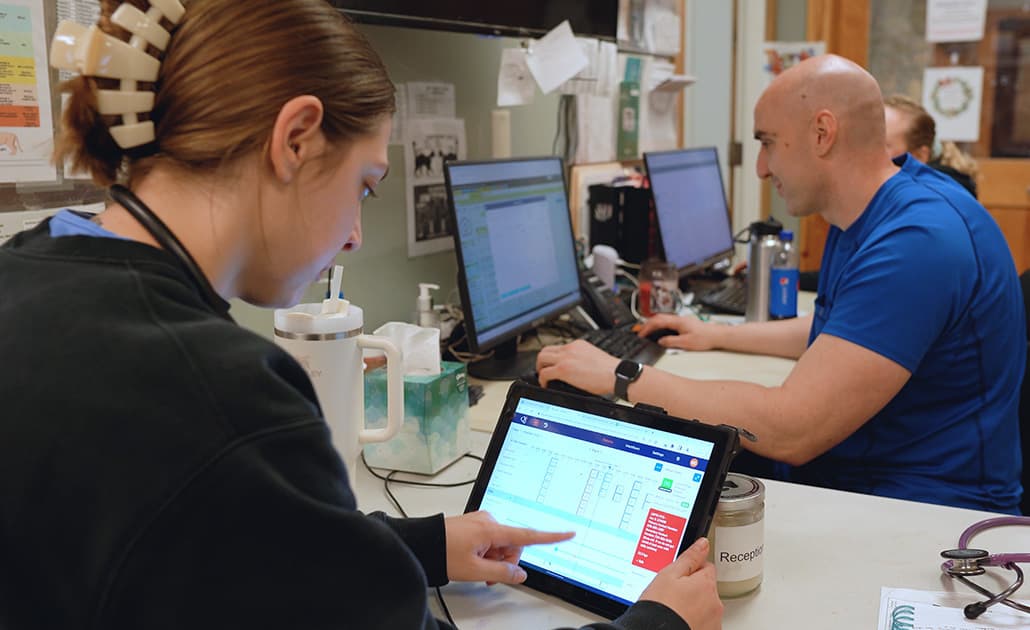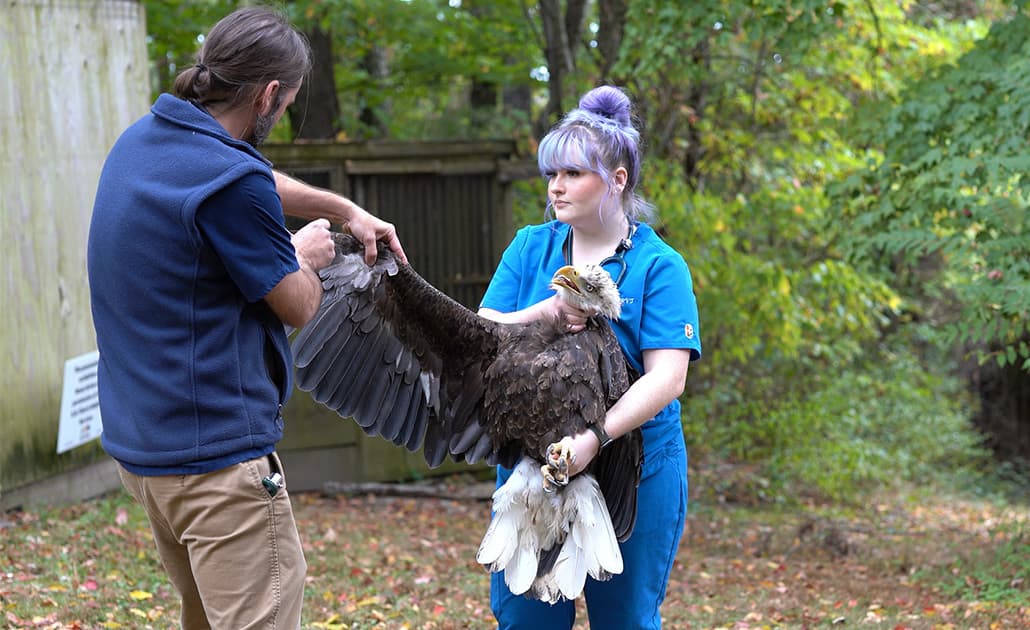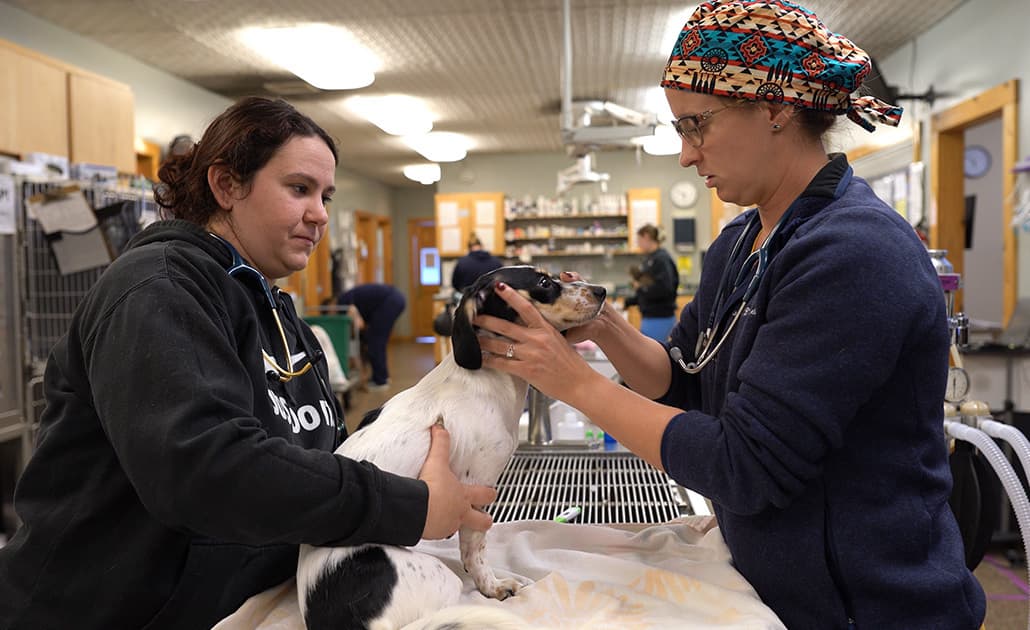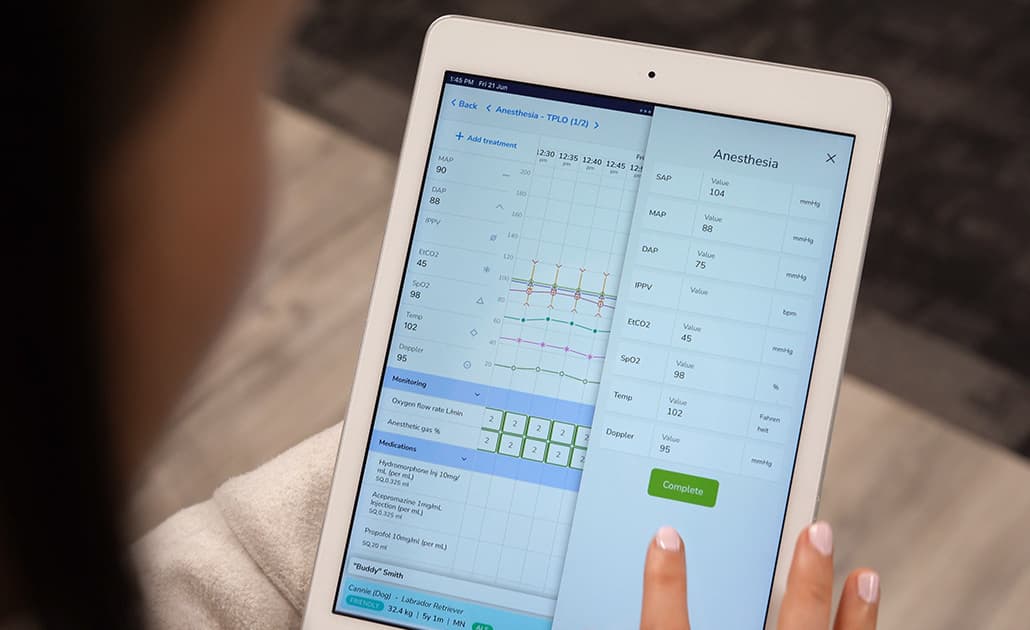In 2000, Dr. Jean Meade took the plunge and purchased a small veterinary clinic in Morgantown, West Virginia.
The plan was simple: She’d work there in the evenings and on the weekends, providing spay and neuter services for the Humane Society. Having worked in clinical practice early in her career before moving into more academic- and research-based roles, this was the perfect opportunity to rekindle her passion for hands-on clinical work while serving the needs of the community.
“I missed clinical practice,” said Jean. “My husband and I were looking for an opportunity to help the Humane Society. I started looking for equipment and wound up purchasing a little strip mall clinic that had been closed for six months. We had no plans of expanding much beyond that.”
Building an empire was never part of the plan. However, despite humble aspirations, the clinic began to expand. As local demand for quality veterinary care grew, Jean hired some staff, turned the clinic into a small general practice, and launched a nonprofit program working with at-risk teens to train service dogs. The practice soon outgrew the modest space and relocated to new premises. Here, the practice blossomed into Cheat Lake Animal Hospital, a truly world-class full-service veterinary facility, complete with 24/7 emergency services, companion animal rehabilitation, a wellness center, a non-profit avian conservation center, and more. Today, the hospital is home to 21 doctors and 120 employees, all committed to providing the very best in veterinary care.
Regular system crashes prompt search for new software

In such a busy hospital, having the right practice management software is key. As Cheat Lake Animal Hospital expanded, the limitations of its former system became more apparent. One of the biggest issues was that the software didn’t allow multiple people to access a patient’s records simultaneously, which started to create major bottlenecks.
“You couldn't have two users in the system accessing the same animal at the same time. If you were trying to write up a record and the front desk was trying to check [the patient] out, somebody had to stop, which was a pain. It wasn’t good for time management,” said Jean.
Remote access was impossible on the server-based system, which meant staff had to be physically on-site to complete their notes. Work-life balance began to suffer. System crashes became more frequent. Restarts were regularly required. As the practice’s client database grew, the software became a constant source of frustration.
“Essentially, we were at capacity,” explained Dr. Jesse Fallon, part owner of Cheat Lake Animal Hospital. “Our old server-based software was not capable of doing what we needed it to do. And it was getting in the way of practicing medicine. It was a major obstacle for us. In order for us to take the next step and do a better job at taking care of our patients, we had to transition to something that was more powerful, easier to use, and more modern.”
Collaboration with trusted VDC leads hospital to ezyVet
Recognizing the need for change, Cheat Lake Animal Hospital began exploring new software options.
During the software selection process, Practice Manager Kelli Geswein worked closely with IDEXX Veterinary Diagnostics Consultant Mary Goodin, who has developed a fantastic relationship with Cheat Lake Animal Hospital. Mary happens to live just a couple of miles down the road from the practice, and regularly visits to provide support, answer questions, and generally make life easier for the practice and the people who work there.
“I don’t feel like this is a job. I feel like this is a calling. I enjoy what I do, and I want pets to get the best health care that they can. And I think that really comes through when I’m communicating with my customers. I get very passionate about getting the most innovative medicine to these animals,” said Mary.
While the team was initially drawn to Cornerstone Cloud, they soon discovered that the weekly downtime required for maintenance would not be feasible in a 24-hour emergency environment. For Kelli, that was a deal breaker.
“The downtime was going to be in the early hours - I think it was it going to be Wednesday mornings from around 3 am to 7 am. But we’re a 24-hour hospital. We can’t have any downtime, period. It was one of those really, really important things that we were looking for in a cloud-based system,” said Kelli.

Drawing on Mary’s expertise and unique understanding of their business requirements, Cheat Lake Animal Hospital instead opted to go with ezyVet, driven by the need for a cloud-based solution that could accommodate the practice’s complex needs.
“It’s really nice having Mary on board as our IDEXX VDC. Whenever we have a lab problem, we can just call and say, ‘Mary, who do we talk to?’ And she says, ‘Don’t worry about it, I’ll fix it.’ And she always does. And now we can do the same thing with ezyVet. We couldn't imagine anything better than having a new software program with an old friend,” said Jean.
IDEXX ecosystem delivers reliability and efficiency
Perhaps the most noticeable change since moving to ezyVet has been the uptick in reliability. Systems crashes are - thankfully! - a thing of the past, while maintenance and regular updates take place seamlessly in the background, eliminating the need for scheduled downtime. As Jesse explained, this allows the team to focus on the task at hand instead of worrying about their software.
“As busy clinicians, most of us don't want to have to think about our practice software. We want it to work when we need it. We want the information where we can get it. And we don't necessarily have the time or desire to be thinking about all the intricacies. So, we need reliability. We need simplicity. And ezyVet has done that for us,” said Jesse.
For Jean, one of the key advantages has been the seamless integration between ezyVet and IDEXX. While the hospital’s previous practice management software did integrate with IDEXX diagnostics services, the system wasn’t immune to the occasional hiccup - and diagnosing the specific cause of the issue was sometimes easier said than done.
“It has been helpful to have one organization [responsible for] both our lab and our software. Before, we were dealing with two different entities. So, if we had a problem between the lab and the software, we couldn’t really be sure where the glitch was. Now, it’s seamless. The more we can reduce the number of people that we deal with, the easier it all is,” said Jean.

A smoother diagnostics process translates to more efficient workflows. Thanks to ezyVet’s deep integration with IDEXX VetConnect PLUS, the Cheat Lake Animal Hospital team can manage diagnostics requests and results and access historical diagnostics data directly inside their practice management system. As Kelli explained, it's a stark contrast to the paper-heavy processes the practice formerly had to deal with.
“The way we used to do it was that a lab result would get faxed in - oh my gosh, remember faxes? - so there was a lot of paper and scanning and attaching. Our lab technicians would have to put a note on the doctor’s board and go find them in person and say, ‘Oh, you have lab results,” said Kelli.
With ezyVet, diagnostic results are automatically sent back to the patient’s clinical record in ezyVet, and doctors are alerted via memo that the results are ready for their assessment. It’s a dramatically more efficient workflow for technicians and doctors and contributes to better quality of care for patients.
Improved clinical workflows with Vet Radar

Cheat Lake Animal Hospital also uses Vet Radar, a patient care tool that extends from ezyVet. While ezyVet focuses on day-to-day practice management tasks, Vet Radar simplifies the management of hospitalized patients through customizable electronic treatment sheets, a powerful electronic whiteboard, anesthesia monitoring, and more.
“One of the aspects of ezyVet that's really improved our ability to care for our patients in an efficient and consistent way is the Vet Radar platform,” said Jesse. “Vet Radar can be used for surgical monitoring. We have essentially eliminated paper entirely from our surgical patients. So, we can use Vet Radar to track the vitals on the patient from blood pressure, to oxygen saturation, heart rate, temperature - all those things are put right on the computer in real time as we're working on that patient and the technicians are recording the data. It's a tremendous time saver for our staff.”
Conclusion
Cheat Lake Animal Hospital's journey with IDEXX has been one of growth, efficiency, and improved patient care. The transition to ezyVet and Vet Radar has not only resolved the issues with the practice’s previous software but has also empowered the staff to focus more on their passion for veterinary medicine and community service.
Want to see what ezyVet could do for your practice? Book a demo today to discover how ezyVet could help your clinic save time, drive revenue, and better serve your patients.